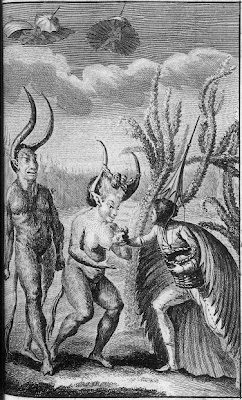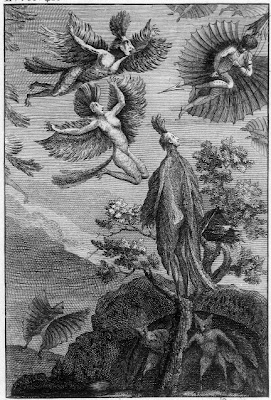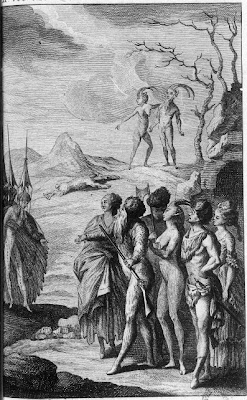


















At once both a proto-science fiction book and also a member of the utopia genre of literature, this exceedingly rare 4-volume work from 1781, 'Découverte Australe par un Homme Volant, ou Le Dédale Français' (Southern Discovery by a Flying Man, or The French Dedalus) is online at BNF (only the illustrations - I've posted all but 1 of them, I think).
The very prolific author and printer, Nicolas-Edmé Restif de la Bretonne (1734-1806), was something of an eccentric or even neurotic character who recorded his own libertine life in many of his works. These included the first real outline of shoe fetishism and a social commentary on prostitution among a diverse range of subject matter. His literary audacity led to his being branded "the Rousseau of the gutter" and "the Voltaire of the chambermaids." I get the feeling from the scant information around online that Restif was, to all intents, an agitator for social reform and his writings would be regarded as very tame today.
The protagonist in 'Découverte Australe par un Homme Volant', Victorin, apparently spends the first third of the book studying insects and designing wing models so that he can whisk his Christine away to a place where their love won't be forbidden.
"He locates an inaccessible mountain, stocks it with the basic necessities (plants, animals, servants), and finally swoops down and carries Christine off. (He seems to have neglected to tell her that he was planning to do this, but fortunately she proves sympathetic. They are married by a priest that he also had the foresight to fly off with.)"Their journey takes them to the archipelago of Megapatagon which is on the opposite side of the world to France, halfway between Tierra del Fuego and Antarctica. So opposite in fact that in the utopian society our heroes found, the language is backwards french, clothes are topsy-turvy (the shoe fetish comes out in hats with shoe qualities...or so they say) and even the capital is Sirap. {I am guessing this allows Restif some satirical distance to comment on perceived deficiencies in his own world}
And obviously, from the point of view of the intriguing engravings above, Victorin and Christine encounter all manner of weird and wonderful 'humans': frogmen, sheepmen, hairymen, elephantmen, dogmen, birdmen, snakemen and other Swiftian imaginary types (mouseover images above for french captions).
- There is no definitive source online to read in relation to this bizarre work. But these links contain snippets about the book: i, ii, iii, iv, v, vi, vii, viii and an excerpt (translation).
- In relation to science fiction: a, b.
- Site devoted to Restif (I haven't looked through this french site at all).
- Kinda sorta related: 1, 2, 3 (nsfw), 4, 5, 6.


7 comments :
Very interesting, thank you. Oddly enough, just yesterday I was reading Pierre Bayle’s article about a 17th-century Utopian account of ‘Terra Australis:’
"Another early work, by the French author Gabriel de Foigny, A New Discovery of Terra Incognita Australis (1676), is noteworthy on two accounts. First, de Foigny referred to the people of his Terre Australe as "Australiens" – which became "Australians" in the 1693 English translation – the first time the term was used to describe the inhabitants of the southern continent. Second, his hero, Jacques Sadeur, is a shipwrecked hermaphrodite who finds Western Australia is populated by a tribe of hermaphrodites."
The quote is from this page, which also mentions Restif’s book.
Thanks. That's actually link iii (but I'd only seen the Restif entry). Interesting: hermaphrodites in W.A. and lilliputians in South Australia - Swift gave specific coordinates. We were quite the imaginative fuel.
Had I but known that Australia was like that, I would assuredly have gone there by now. I mean, I like kangaroos, but marsupials are pretty run-of-the-mill compared to what we see here.
As for Restif, the interwar Czechs seem to have regarded him as a pornographer, but I didn't really get that impression from anything else I've seen about him. (I have a copy of Nuits de Paris, but it's unread in a box.)
marsupials are pretty run-of-the-mill compared to what we see here
Karla, when you say 'here' I thought at first you were talking about the Czech Republic and I was thinking "Wow! what sort of odd critters do they have I've not heard about?". I had to go away (yeah, I'm slow) and process it a bit further before I finally realised 'here' meant this post.
Your take on Restif is exactly how I found it -- there seems to be a body of commentary that just reactively label him a deviant (probably copying each other to an extent, I suspect). But when you look further into it, there was more of an Enlightenment-influenced social activist predominating.
If there is anything like this roaming around in the Czech Republic, I've been missing out! But if you ever get to Prague, you'll want to take a look at the Strahov Library, not to be mistaken for the nearby archive where I so often hang out. (I wonder if Strahov has anything online? the Czechs are starting to digitize lots of stuff. The Národní knihovna has done the Dalibor chronicle but I don't know whether it's online or just sells as a book and postcards.)
Er, make that Dalimil, not Dalibor. Entirely different person. Anyhow, a little looking around got me to this page, which may prove useful:
http://www.manuscriptorium.com/Site/ENG/default_eng.asp
I know the manuscriptorium from days of yore. But thanks for those words - you're right about the increase in Czech material online. It's just a bit hard searching from a point of language and content ignorance! That's why portal sites are good - just point to library home pages and then good old calculated blind searching.
Post a Comment
Comments are all moderated so don't waste your time spamming: they will never show up.
If you include ANY links that aren't pertinent to the blog post or discussion they will be deleted and a rash will break out in your underwear.
Also: please play the ball and not the person.
Note: only a member of this blog may post a comment.